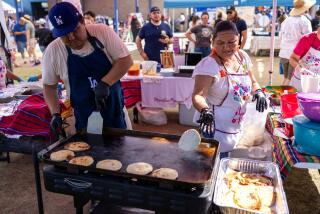Politics, Culture Mix in Croatian-American Event
- Share via
HUNTINGTON BEACH — With violence raging in their homeland, 600 Croatian-Americans from across Southern California gathered Saturday to celebrate their culture, raise funds to help those struggling and starving abroad, and galvanize political pressure to sever U.S. diplomatic relations with Serbia.
Politics and culture were intertwined at the lively picnic in the European-style Old World Festival Hall.
Videotapes of modern dramas and music were on sale alongside visual chronicles of the latest horrors in the war-torn country. “Kiss Me I’m Croatian” buttons and stickers screaming “Stop Serb Genocide” with red splotches across the words sat on the same table.
Paintings and drawings of Croatia’s gorgeous landscapes and ancient architecture hung next to abstract images of emaciated, beaten bodies. Amid bright pictures depicting the countryside was a stark, black poster with the desperate face of a woman holding an infant and the ominous plea: “Save the children of Croatia.”
“I love my heritage. I love my people,” said Maryann Zovak, 31, of Newport Beach, who moved to the United States when she was 2 years old and who organized the $25-a-head picnic for the Croatian-American Society of Orange County. “I can’t sit by idle while the slaughter goes on.”
Since its founding in February, 1992, the Croatian-American Society of Orange County has sponsored three gala picnics and raised nearly $50,000 for humanitarian aid. About 10,000 Croatians live in Orange County, but people from Santa Barbara to San Diego were at Saturday’s event.
“It’s a tragedy that the world stands by and continues to negotiate when people are dying in front of our eyes,” said Zovak. “We see it every day. I just wonder how long it’s going to take to stop this madness.”
Anger and frustration about the war were part of most conversations as people huddled around baskets of grapes on picnic tables, drinking beer and chatting in their native language over folk tunes billowing from the loudspeaker.
As the smell of barbecued lamb wafted through the cavernous hall, a troupe of Los Angeles high school students trotted onto the stage, singing Croatian folk songs and performing traditional kolo dance steps.
With one hand on their hips, the other holding a freshly painted Easter egg, a dozen girls alternately sashayed and stomped across the stage in ankle-length black boots, then whipped around to make their white peasant skirts and black aprons twirl up.
A dozen boys joined their partners on stage, one hand on each other’s shoulder as they hop-skipped in a circle, exchanging black felt hats from one head to the next in time to the music.
“It’s invigorating,” Hilda Foley, who left her native Zagreb in 1941, said of the ethnic food, dancing and chatter. “The music and everything . . . it makes you feel at home.”
More to Read
Sign up for Essential California
The most important California stories and recommendations in your inbox every morning.
You may occasionally receive promotional content from the Los Angeles Times.













